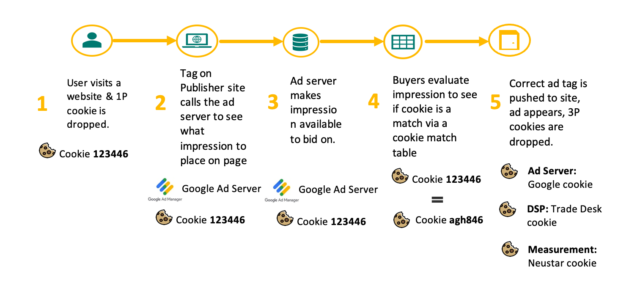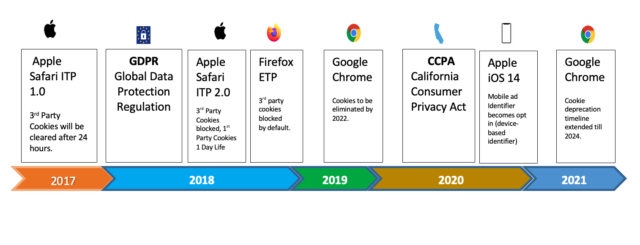As privacy and security remain a top priority, major platforms like Google are working to phase out advertising cookies as soon as the end of 2024. This is great news for data protection, but what does it mean for digital marketers?
In this series, we’ll discuss the impact a cookieless world will have on our digital landscape and the steps you can start taking now to navigate it successfully.
But first, let’s do a quick refresher on what cookies are.
What are Cookies?
A cookie is a piece of data stored on a user’s computer by a web browser when the user interacts with a website. Cookies store information like user identifiers, login details, and shopping cart information.
There are two main types of cookies: first-party cookies and third-party cookies.
1. First-Party Cookies:
First-party cookies are created and managed by the website that the user is browsing or interacting with. They are primarily used for on-site personalization, storing preferences, language settings, and other relevant details.
2. Third-Party Cookies:
Third-party cookies are created by the website that users visit but are not necessarily stored or owned by the website or its parent company. They are used for cross-site ad tracking, wider audience profiling and targeting, and tracking and measurement by multiple ad servers, publishers, advertisers, and measurement partners.
Here’s an example of how cookies work:

The Deprecation of Cookies
The landscape of cookies started to crumble when Google announced its plan to stop supporting third-party cookies in Chrome. Other browsers like Firefox and Apple soon followed suit. Although Google has postponed its plan until at least 2024, we know this deprecation of third-party cookies is imminent.
So how did we get here? Browsing platforms have been making changes to how cookies are used for some time. But it’s likely that this push for a cookieless landscape is due to a combination of Global Data Protection Regulations and heightened consumer awareness of how personal data is being captured.

Living Life Cookieless: What are the implications?
The deprecation of cookies will have a significant impact on advertising, marketing, retargeting, and analytics. Here are four of the direct implications we can expect to see:
1. Publisher cost implications will impact personalized ad experiences.
Retargeting will be impacted by cookie deprecation; thus, performance and cost implications will likely follow for publishers, third-party data providers, and advertisers. The consumer digital experience will be less personalized as a result.
2. The rise of paid-access option only will have a direct impact on the Internet.
Third-party cookie deprecation will make advertising less attractive favoring subscription models over ad-supported models. This shift may result in limited web accessibility with more environments requiring users to pay for access.
3. An increased dependency on data partnership.
The absence of third-party cookies will increase the need for data partners to help with data enrichment of 1st party data, data hygiene, and user identification. Second-party data partnerships will become increasingly important.
4. A direct impact on visitor analytics.
The once more straightforward task of “knowing your customer” will become more complex without the assistance of cookies. Implementing analytics and personalization solutions will require a deeper analysis of the limited visitor data collected.
Navigating a Cookieless Landscape
As the era of cookieless browsing approaches, the digital advertising and marketing industry must adapt to a new paradigm. The deprecation of third-party cookies will disrupt established practices, leading to changes in ad experiences, business models, data partnerships, and visitor analytics. Understanding these shifts is crucial for businesses and marketers to navigate the evolving digital landscape successfully.
Stay tuned for the next blog in this series where we’ll discuss what the opportunities for cookieless tracking are.
In the meantime, check out our other blogs.
